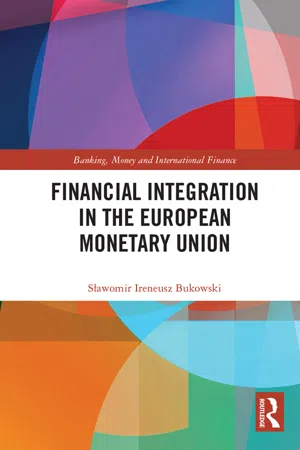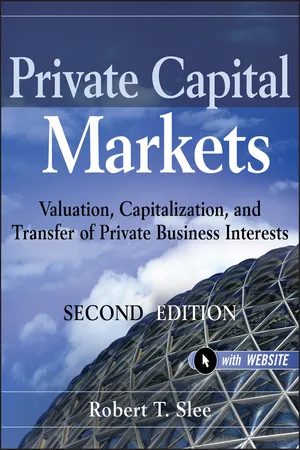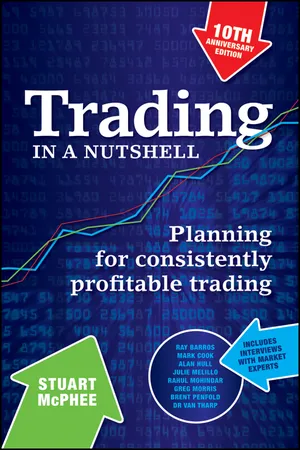Capital Market
The capital market is a financial market where long-term debt or equity-backed securities are bought and sold. It provides a platform for businesses and governments to raise funds by issuing stocks and bonds, and for investors to buy and sell these securities. The capital market plays a crucial role in allocating financial resources and facilitating economic growth.
6 Key excerpts on "Capital Market"
- eBook - ePub
An Introduction to International Capital Markets
Products, Strategies, Participants
- Andrew M. Chisholm(Author)
- 2009(Publication Date)
- Wiley(Publisher)
...1 Introduction: The Market Context 1.1 CAPITAL AND THE Capital MarketS Financial capital can be defined as accumulated wealth that is available to create further wealth. The Capital Markets are places where those who require additional funds seek out others who wish to invest their excess. They are also places where participants can manage and spread their risks. Originally, Capital Markets were physical spaces such as coffee houses and then purpose-built exchanges. In our day, Capital Markets participants may be located in different continents and conduct deals using advanced information technology. Who are the users of capital? In a broad sense we all are, at least part of the time. We borrow money to buy a house or a car so that we can live our lives, do our jobs, and make our own small contribution to the growing wealth of nations. We save to pay school and university tuition fees, investing in the ‘human capital’ that will sustain the economic health of the country. More narrowly, though, financial capital is used by corporations, governments, state and municipal authorities, and international agencies to make investments in productive resources. When a company builds a new factory it is engaged in capital expenditure - using funds provided by shareholders or lenders or set aside from past profits to purchase assets used to generate future revenues. Governments use tax revenues to invest in infrastructure projects such as roads. Agencies such as the World Bank inject funds into developing countries to create a basis for economic growth and future prosperity. Who are the suppliers of capital? Again, the answer is that we all are. Sometimes we do this directly by buying shares issued by corporations and debt securities issued by governments and their agencies. Sometimes we employ brokers to invest funds on our behalf. We deposit cash in bank accounts, invest in mutual funds, and set aside money in pension plans for our retirement...
- eBook - ePub
Corporate Finance
Theory and Practice
- Pierre Vernimmen, Pascal Quiry, Yann Le Fur(Authors)
- 2022(Publication Date)
- Wiley(Publisher)
...A Capital Market economy is characterised by direct solicitation of investors' funds. Economic agents with surplus resources invest a large portion of their funds directly in the Capital Markets by buying companies' shares, bonds, commercial paper or other short-term negotiable debt. They do this either directly or through mutual funds. Intermediation gives way to the brokerage function, and the business model of financial institutions evolves towards the placement of companies' securities directly with investors. In this economic model, bank loans are extended primarily to households in the form of consumer credit, mortgage loans, etc., as well as to small enterprises that do not have access to the Capital Markets. The following graphs provide the best illustration of the rising importance of Capital Markets. …be it in terms of the number of listed companies… Note: Domestic companies only. Source : Data from World Federation of Exchanges, NYSE-Euronext, London Stock Exchange, Bourse de Casablanca, Bolsa Madrid, Beirut Stock Exchange, Borsa Italiana …or market capitalisation Source : Data from World Federation of Exchanges, NYSE-Euronext, Beirut Stock exchange, Borsa Italiana, London Stock Exchange Transaction volumes are linked to the economic environment, even if the long-term trend shows a clear increase. Source : Data from World Federation of Exchanges, SIFMA Section 15.2 PRIMARY, SECONDARY AND DERIVATIVE MARKETS 1/ FROM THE PRIMARY MARKET TO THE SECONDARY MARKET The new issues market (i.e. creation of securities) is called the primary market. Subsequent transactions involving these securities take place on the secondary market. Both markets, like any market, are defined by two basic elements: the product (the security) and the price (its value). Thus, shares issued or created when a company is founded can later be floated on a stock exchange, just as long-term bonds may be used by speculators for short-term strategies...
- Sławomir Ireneusz Bukowski(Author)
- 2019(Publication Date)
- Routledge(Publisher)
...14). The financial market is one of the key markets in economy, connected with the market of products and services and labor markets through the supply-and-demand coupling and prices. On the one hand, financial markets are platforms where short-, medium- and long-term financial transactions take place and, on the other, mechanisms of short- and long-term capital mobilization and its allocation in order to finance investment ventures operate. Financial instruments embodying capital are traded in financial markets. A financial instrument is a contract (agreement) between two parties that governs financial interdependence between them. A financial market has its infrastructure created by a network of relationships among banks, investment fund companies, insurance societies and stock exchanges. The financial market participants include financial institutions, enterprises, households and the state. These entities provide financial capital and benefit from it at a specific price: interest. Financial markets fulfill an important role in economy. First, they provide a mechanism of capital mobilization for investment purposes, its allocation and its transfer of financial capital into production capital. Second, they determine the price of capital and enable estimations of investment risk, which is the basis of investment decision-making. Third, they strengthen the motivating role of profit in enterprises and enable the enterprise value assessment. Fourth, they assure liquidity in economy, which means that all of the needs of economic entities in terms of money are satisfied. Moreover, financial markets play an important role in the absorption of economic shock results. The financial market institutions include the legal system regulating capital turnovers, institutions of state financial supervision, financial intermediaries and financial instrument exchange markets...
- eBook - ePub
Private Capital Markets
Valuation, Capitalization, and Transfer of Private Business Interests
- Robert T. Slee(Author)
- 2011(Publication Date)
- Wiley(Publisher)
...CHAPTER 1 Capital Markets This book explores private Capital Markets, the last major uncharted financial markets. Private markets contain millions of companies, which generate more than half of the gross domestic product (GDP) of the United States and the world. Yet these markets are largely ignored, partly because of the difficulty obtaining information and partly because of the lack of a unified structure to approach them. This work offers such an approach. It provides a theoretical and practical framework that enables readers to make sound investment and financing decisions in the private Capital Markets. A Capital Market is one in which businesses can raise debt and equity funds. Since the 1970s, public Capital Markets have received almost all of the attention from academics in the literature. 1 In 2004, the first edition of this book challenged the assumption that public and private Capital Markets are substitutes, showing instead that the two markets were different in most meaningful ways...
- eBook - ePub
Trading in a Nutshell
Planning for Consistently Profitable Trading
- Stuart McPhee(Author)
- 2011(Publication Date)
- Wiley(Publisher)
...Chapter 2: Financial markets In a nutshell •There are numerous trading products available across many different financial markets. •Financial markets are a vital part of the world economy. •Stocks are the ideal starting point for traders. What are stock exchanges? Stock exchanges are financial markets that bring buyers and sellers of capital together in an efficient manner. They channel capital resources to those who will make the best use of them. Ultimately, resources that are used efficiently will benefit the whole community and not just the entity receiving the funds. In a layperson’s terms: if you had $10 000 to invest in a new company, you would experience some difficulty in establishing a new business and generating a profit within a certain period of time. However, with that same $10 000 you are able to invest in a well-established, already consistently profitable business and then benefit through capital gain and/or receiving your share of the profits. Having access to such an efficient process of capital resource allocation, we should ideally earn the best rate of return when investing in companies listed on a stock exchange. Unfortunately, this is not always the case. On all markets, there are many listed companies that make no money at all, despite their best efforts to do so, and thousands of people have lost all their money after investing in companies that are subsequently wound up. The importance of stock exchanges around the world to the various economies cannot be overstated. They are a vital part of the corporate world. The largest companies in the world that are well known by the majority of people are all listed companies on their respective stock exchanges. The most common financial product traded on stock exchanges is stocks or shares — these terms are commonly used interchangeably. Shares are equity securities, and represent the basic unit of ownership in a company. The total of all the shares in a company represents its equity capital...
- Moorad Choudhry(Author)
- 2001(Publication Date)
- Butterworth-Heinemann(Publisher)
...These are known as locals on the London International Financial Futures and Options Exchange (LIFFE) 2. Locals trade securities for their own account to counteract a temporary imbalance in supply and demand in a particular security; they are an important source of liquidity in the market. Locals earn income from brokerage fees and also from pure trading, when they sell securities at a higher price than the original purchase price. 1.3.3 Markets Markets are that part of the financial system where Capital Market transactions, including the buying and selling of securities, takes place. A market can describe a traditional stock exchange, a physical trading floor where securities trading occurs. Many financial instruments are traded over the telephone or electronically over computer links; these markets are known as over-the-counter (OTC) markets. A distinction is made between financial instruments of up to one year’s maturity and instruments of over one year’s maturity. Short-term instruments make up the money market while all other instruments are deemed to be part of the Capital Market. There is also a distinction made between the primary market and the secondary market. A new issue of bonds made by an investment bank on behalf of its client is made in the primary market. Such an issue can be a public offer, in which anyone can apply to buy the bonds, or a private offer where the customers of the investment bank are offered the stock. The secondary market is the market in which existing bonds and shares are subsequently traded. A list of selected world stock exchanges is given in Appendix 1.1. Figure 1.3 Number of stock exchanges around the world. World Bank, OECD. 1.4 World bond markets The origin of the spectacular increase in the size of global financial markets was the rise in oil prices in the early 1970s...





